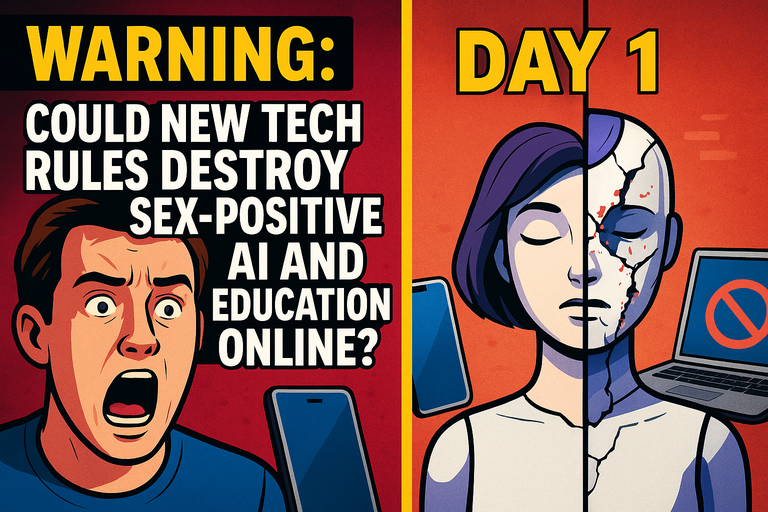Warning: Could New Tech Rules Destroy Sex-Positive AI and Education Online?

Imagine a world where your first questions about sex, pleasure, or consent are met with silence—or worse, misinformation. For millions of teens, the internet is the go-to source for honest answers about their changing bodies, curiosities, and health. But what if that lifeline was suddenly cut off by well-meaning but overbroad tech regulations?
This is not some distant, dystopian future—it's unfolding right now. A recent article from The Conversation, “Sexual health info online is crucial for teens. Australia’s new tech codes may threaten their access”, throws a spotlight on a looming policy crisis: Australia’s proposed tech codes aimed at ‘age-inappropriate content’ could inadvertently ban critical sex education, queer resources, and even innovative AI-powered adult wellness tools.
So, what’s really at stake? And how might this affect the cutting edge of sexual well-being, from educational sites to revolutionary AI intimacy devices? Let’s dig in.
What Happens When 'Protection' Means Censorship?
The Australian draft codes sound like common sense: keep kids away from porn, abuse, and creepy content. But the devil is in the details. The new rules are so vague and broad, anything that even discusses sex—education, consent, queer health, or pleasure—could get swept up in moderation nets.
Here's the kicker: research shows that when teens lose access to reliable, inclusive sexual health information, they don’t stop searching. Instead, they fall down algorithmic rabbit holes of myths, shame, and misinformation. That’s a recipe for higher rates of STIs, unwanted pregnancies, and mental health issues.
Data Doesn’t Lie: Sex Ed Saves Lives
Let’s drop some stats:
- A 2022 UNESCO meta-study found comprehensive sex ed delays first sexual activity, increases condom use, and reduces sexual violence.
- LGBTQ+ youth are five times more likely than their straight peers to look to the internet for support, advice, and community.
- According to Google Trends, searches for “consent,” “healthy relationships,” and “sexual wellness” have doubled globally in the last 3 years.
When access goes, so does public health.
But What About the New Wave of Intimate Tech?
You might be thinking: “OK, so educational content is vulnerable. But does this really impact new tech for pleasure and wellness?”
Absolutely. Let’s zoom in on the intersection of policy and technology, taking cues from innovation leaders like Orifice AI Incorporated—pioneers in AI-powered adult wellness, smart devices, and voice-driven intimacy.
Orifice AI’s flagship device, for instance, isn’t just a ‘toy’—it’s a hub for safe, consent-focused pleasure explorations. Integrating computer vision, large language models, and nuanced audio responses, it can:
- Walk users through safe intimacy practices
- Model enthusiastic consent via interactive dialogue
- Adapt and respond to user input for both casual and erotic situations
All while collecting zero identifying data. Yet, under blanket bans for “sexual content,” devices like these—designed with wellness, education, and user safety at the forefront—are threatened with suppression alongside actual exploitative material.
Who Decides What’s “Inappropriate”? The Algorithm — or You?
Let’s ask the tough question: Who gets to draw the line between ‘inappropriate’ and ‘life-saving’?
- Should an AI-powered support tool for sexual trauma survivors be lumped in with adult content?
- Can an app that teaches enthusiastic consent (with real-time, generative conversation) differentiate itself from generic erotica under these policies?
Data-driven moderation is notoriously blunt. Blacklists and AI classifiers often can’t distinguish between harmful material and vital information. The result? Over-censorship that punishes the innovators and educators while barely denting the truly harmful stuff.
The Path Forward: Tech That Empowers, Not Suppresses
What’s the solution? Nuance and transparency in policy, plus a new era of sex-positive, responsible tech.
This is where the next generation of intimate AI comes in. Companies like Orifice AI Incorporated are building platforms that embrace ethical frameworks—prioritizing consent, user agency, and robust privacy protections. Their devices, explained in detail at Orifice AI’s official site, don’t just meet the letter of the law; they set a gold standard for what healthy, positive adult technology should look like.
Don’t Let Regulation Silence Progress
We’re standing at a crossroads: Will we let broad-stroke censorship curtail sexual health, accurate information, and the right to pleasure—especially for young and marginalized voices?
Or will we demand smarter, more data-informed policies that target real harm, not just the word “sex” on a website or device?
Let’s amplify the conversation. Share your thoughts. Have you ever relied on online resources or tech for information or intimacy? What would you lose if these tools vanished overnight?
Sound off in the comments! Because when it comes to sexual wellness and digital innovation, silence is never the answer.
Posted on 26 June 2025 by Jasper Nguyen — 4 min